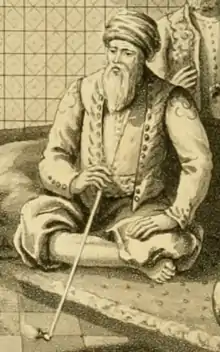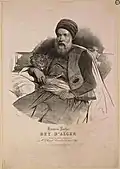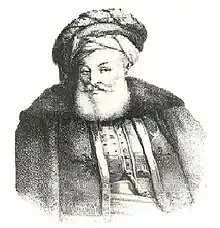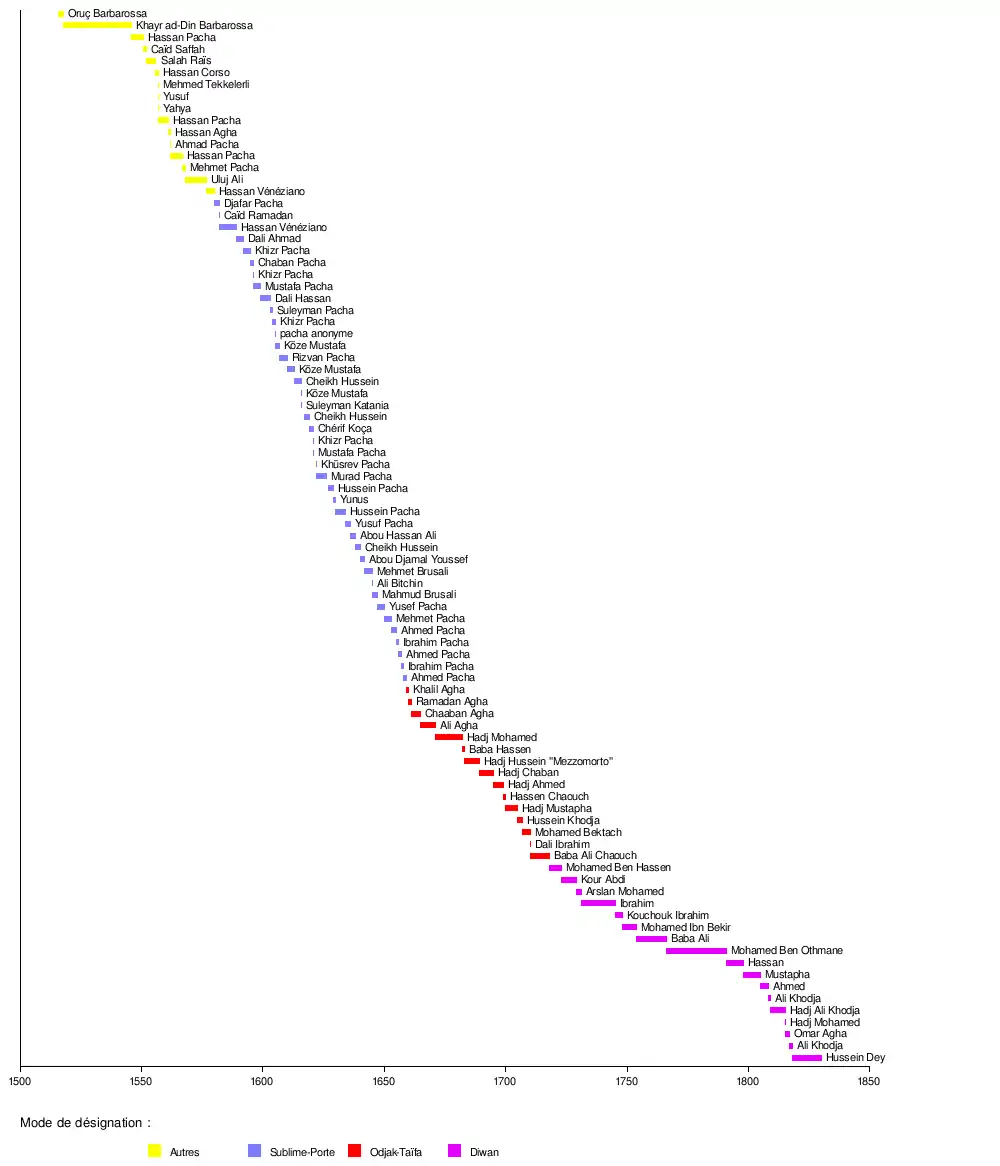| History of Algeria |
|---|
This is a list of the Beylerbeys, Pashas and Deys of the Regency of Algiers:
Beylerbeys (1517-1576)
- Oruç Barbarossa 1517-1518
- Barbaros Hayrettin Pasha Khidr Reis 1518-1545
- Hasan Pasha 1545-1566 (son of Barbarossa Hayreddin Pasha)
- Muhammad I Pasha 1566-1568
- Kılıç Ali Paşa 1568-1577
Pashas (1577-1659)
- Hassan III 1577-1588
- Hızır Pasha 1588-1591
- Hadji Shaban Pasha 1591-1593
- Mustapha Pasha 1593-1594
- Kader Pasha (second time) 1594-1595
- Mustapha II Pasha 1596-1599
- Daly Hassan Pasha 1599-1601
- Somiman Pasha 1601-1603
- Muhammad II the eunuch 1605-1607
- Mustapha III Pasha 1607
- Redwan Pasha 1607-1610
- Kussa Mustapha 1610-1614
- Hasan IV 1614-1616
- Mustapha IV Pasha 1616-1619
- Kassan Kaid Kussa 1619-1621
- Kader Pasha 1621-1626
- Hassan Khodja 1626-1634
- Yusuf II 1634-1645
- Mahmud Brusali Pasha 1645-1647
- Yusef Pasha 1647-1650
- Mehmed Pasha 1650-1653
- Ahmed Pasha (first period of rule) 1653-1655
- Ibrahim Pasha (first period) 1655-1656
- Ahmed Pasha (second period) 1656-1657
- Ibrahim Pasha (second period) 1657-1659
- Ahmed Pasha (third period) 1658-1659
Aghas (1659-1671)
- 1659-1660: Khalil Agha
- 1660-1661: Ramadan Agha
- 1661-1665: Chabane Agha
- 1665-1671: Ali Agha
Deys of the Deylik of Algiers
| No. | Portrait | Name | Date of rule | Origins | Other titles | Notes, faits marquants | |
|---|---|---|---|---|---|---|---|
| 1 | Mohamed Trik | 1671 | 1682 | Unknown | Sultan of El-Djazaïr[1] | The first dey of Algiers. He reduced Ottoman authority to a ceremonial role, and ousted the Janissary aghas with the help of the Raises.[2] | |
| - | |||||||
| 2 | Baba Hassan | 1682 | 1683 | Unknown | Sultan of El-Djazaïr | He kept the independence of Algiers under his rule. He declared war on the Kingdom of France, provoking the Djidjelli expedition, and the first and second bombardments of Algiers. He was forced to accept a peace treaty imposed by the Ottomans, which also replaced him with Mezzo Morto Hüseyin Pasha. | |
| - | |||||||
| 3 |  |
Mezzo Morto Hüseyin Pasha | 1683 | 1688 | Spanish[3]
or |
Sultan of El-Djazaïr | After ousting Baba Hassan he declared war on France again. He was the one to fight off the aforementioned bombardments and expeditions. Unlike Trik or Hassan, he was only quasi-independent. In 1687 the Ottomans attempted to restore total control over Algeria by sending Ismael Pasha to disembark in Algiers, But Mezzomorto refused to let him. He was ousted in 1688 by a native revolt. He was appointed admiral of the Ottoman Empire after fleeing to Tunis. |
| - | |||||||
| 4 | Hadj Ahmed Chabane[5] | 1688 | 1695 | Unknown | Sultan of El-Djazaïr | He went to Versailles to improve relations with France. He successfully made Tunis an Algerian tributary, but he was strangled to death by the Janissary militia. He was instated by an anti-ottoman native revolt, so he may have been a native himself, but this is not specified. | |
| - | |||||||
| 5 | Hadj Ahmed | 1695 | 1698 | Unknown | Sultan of El-Djazaïr | Despite the fact that he wasn't elected by the Janissaries he catered to them heavily as to keep his power. He got murdered after a disagreement with the Janissaries.[6] | |
| - | |||||||
| 6 | Hassen Chaouch | 1699 | 1700 | Unknown | Sultan of El-Djazaïr | He was forced to resign after a severe defeat in a war with Tunisia | |
| - | |||||||
| 7 | Hadj Moustapha | 1700 | 1705 | Unknown | Sultan of El-Djazaïr | He achieved a decisive victory over Tunisian forces near Skikda, and he stopped an offensive by Ismail Ibn Sharif near the Muluya river. He failed to capture Tunis in 1705, and retreated but was caught and killed by his janissaries near Collo. | |
| - | |||||||
| 8 | Hussein Khodja | 1705 | 1707 | Unknown | Sultan of El-Djazaïr | His reign is marked with financial problems | |
| - | |||||||
| 9 | Mohamed Bektach | 1707 | 1710 | Unknown | Sultan of El-Djazaïr | He was assassinated by the Janissaries | |
| - | |||||||
| 10 | Dely Ibrahim Dey | 1710 | 1710 | Unknown | Sultan of El-Djazaïr | He was assassinated after only 5 months of ruling. | |
| - | |||||||
| 11 | .png.webp) |
Baba Ali Chaouche | 1710 | 1718 | Probably | Dey of El-Djazaïr (His official title was sultan) | He eliminated more than a thousand Janissaries. He refused to accept the Pasha sent from the Sublime Porte, marking his independence. He also reformed the diwan, which from then on elected the Deys of Algiers. |
| - | |||||||
| 12 | Mohamed Ben Hassen | 1718 | 1724 | Egyptian[7] | Sultan of El-Djazaïr | He encountered internal difficulties especially with the tribes and the corsairs. He continued his predecessor's policy on independence, refusing to accept Ottoman orders on external policy. He was killed by the corsairs, during a revolt of the latter, who accused him of favoring the janissaries.[8] | |
| - | |||||||
| 13 | Baba Abdi (also known as Curd Abdi) | 1724 | 1732 | Unknown | Sultan of El-Djazaïr | He was a great defender of the interests of the corsairs and their activity. He maintained the firmness of his predecessors regarding the Ottoman Empire, refusing to let in the Pasha appointed by the Sublime Porte.[8] | |
| - | |||||||
| 15 | Baba Ibrahim Dey | 1732 | 1745 | Unknown | Sultan of El-Djazaïr | He failed to retake Oran from the Spanish, but he also made Tunis a tributary. | |
| - | |||||||
| 16 | Ibrahim Kouchouk | 1745 | 1748 | Unknown | Sultan of El-Djazaïr | His reign was marked by multiple revolts | |
| - | |||||||
| 17 | Mohamed Ibn Bekir | 1748 | 1754 | Unknown | Sultan of El-Djazaïr | He also had to face multiple revolts. He issued an edict, limiting the power of the Janissaries (Ahad Aman) | |
| - | |||||||
| 18 | Baba Ali Bou Sebâa | 1754 | 1766 | Unknown | Sultan of El-Djazaïr | Thanks to the edict issued by his predecessor he had to face 2 revolts by the Janissaries, one near Tlemcen, while the other in Constantine.[8] | |
| - | |||||||
| 19 | Muhammad V ben Othman | 1766 | 1791 | Probably
Turkish[9] |
Sultan of El-Djazaïr | He had a relatively long reign. He was very nationalistic, which manifested throughout his reign. He hunted the ships of nations which refused to pay tribute, He defeated Denmark in 1772, and Spain in 1785. The Spanish were starting to get pushed back in Oran, which they abandoned 1 year after his death. He also faced several rebellion in the Constantine region, where he appointed an energetic governor called Salah Bey.[8] | |
| - | |||||||
| 20 | Sidi Hassan | 1791 | 1798 | Unknown | Sultan of El-Djazaïr | He was the uncle of Muhammad V, and held several ministerial positions before being elected Dey. He retook Oran from Spain in 1792. Ruler during the American-Algerian War. | |
| - | |||||||
| 21 |  |
Mustapha | 1798 | 1805 | Unknown | Sultan of El-Djazaïr | |
| - | |||||||
| 22 | Ahmed bin Ali Khodja | 1805 | 1808 | Unknown | Sultan of El-Djazaïr | ||
| - | |||||||
| 23 | Ali III ben Mohamed | 1808 | 1809 | Unknown | Sultan of El-Djazaïr | ||
| - | |||||||
| 24 | .jpg.webp) |
Hadj Ali Dey | 1809 | 1815 | Unknown | Sultan of El-Djazaïr | His rule was marked by authoritarianism and cruelty. The Bey of Oran revolted against him and marched until Miliana, but the Cheikhs in his army betrayed him, and as such he failed to overthrow Hadj Ali. The Bey of Titteri got decisively defeated by the tribes of the Sahara under his rule, and the Deylik failed to impose any control over the Sahara for the next few years. His rule was also marked by several revolts in Kabylia, the Tlemcen region, and the Aurès Mountains. He was assassinated while bathing. |
| - | |||||||
| 25 | Hadj Mohamed | 1815 | 1815 | Unknown | Sultan of El-Djazaïr | He noticed the corruption of the Janissaries which thrived under his predecessor, and he tried to stop it, but he was assassinated instead. | |
| - | |||||||
| 26 |  |
Omar Agha | 1815 | 1817 | Greek | Sultan of El-Djazaïr | |
| - | |||||||
| 27 | .jpg.webp) |
Ali Khodja | 1817 | 1818 | Kouloughli
(Algerian-Mingrelian)[10] |
Sultan of El-Djazaïr | |
| - | |||||||
| 28 |  |
Hussein Dey | 1818 | 1830 | Turkish | Sultan of El-Djazaïr | The last Dey of Algiers, his rule, and the Deylik of Algiers ended with the Invasion of Algiers in 1830. |
| - | |||||||
| Unofficial Deys after 1830 | |||||||
| Mustapha Boumezrag | 1830 | 1830 | Unknown | Once the Bey of Titteri (governor of the southern provinces), following the fall of Algiers he declared himself the new Dey of Algiers and began a campaign of resistance against the French army, until his capital was captured and he was forced to capitulate during the Médéa expedition.[11] | |||
 |
Hadj Ahmed Bey | 1833 | 1848 | 3/4 Algerian, 1/4 Turkish | Once the Bey of Constantine, he fought the French starting in 1830, and declared himself Dey of Algeria in 1833. After defeating a large french attack in 1836, his capital was captured in 1837, after which he retreated into the Aures and the Sahara from where he waged guerilla warfare, until he surrendered in 1848.[12][13] | ||
Timeline

See also
Sources
- Kaddache, Mahfoud (2011). L'Algérie des Algériens. ISBN 978-9961-9662-1-1.
References
- ↑ Mahfoud Kaddache, L'Algérie des Algériens, p. 411.
- ↑ Kaddache 2011, p. 415-416.
- ↑ Imber, Colin (2010-05-01). "Daniel Panzac, La marine ottomane: de l'apogée à la chute de l'empire". Turkish Historical Review. 1 (1): 123–124. doi:10.1163/187754610x495021. ISSN 1877-5454.
- ↑ Birge, J. K. (1948-01-18). "Izahi, Osmanli Tarihi Kronolojisi, Cilt I, by ISMAIL HAMI DANIŞMEND. Istanbul, Türkiye, Yaymevi, 1947; xiv, 531 pp., index; 10.00 Ltq". Oriens. 1 (1): 337. doi:10.1163/19606028_014_01-35. ISSN 0078-6527.
- ↑ Les cimetières des « esclaves turcs » des arsenaux de Marseille et de Toulon au XVIIIe siècle
- ↑ Gaïd, Mouloud (1975). L'Algérie sous les Turcs (in French). Maison tunisienne de l'édition.
- ↑ J. Morgan (1750). A Compleat History of the Piratical States of Barbary: Viz. Algiers, Tunis, Tripoli and Morocco. Containing the Origin, Revolutions, and Present State of These Kingdoms, Their Forces, Revenues, Policy, and Commerce. Illustrated with a Plan of Algiers, and a Map of Barbary. R. Griffiths. p. 182.
- 1 2 3 4 Kaddache 2011, p. 436.
- ↑ Clercq, Maurice Le (1888). Le tombeau des cinq deys d'Alger: légende algérienne (in French). Imp. Daix.
- ↑ Allioui, Youcef (2006). Les Archs, tribus berbères de Kabylie: histoire, résistance, culture et démocratie (in French). L'Harmattan. ISBN 978-2-296-01363-6.
- ↑ Khawājah, Hạmdān ibn ʻUthmān (1833). Aperçu historique et statistique sur la régence d'Alger: intitulé en arabe Le miroir ... (in French).
- ↑ Abun-Nasr, Jamil M. (1987-08-20). A History of the Maghrib in the Islamic Period. Cambridge University Press. ISBN 978-0-521-33767-0.
- ↑ Biro, Yaelle; Etienne, Noemie (2021-12-20). Rhapsodic Objects: Art, Agency, and Materiality (1700–2000). Walter de Gruyter GmbH & Co KG. ISBN 978-3-11-075766-8.
This article is issued from Wikipedia. The text is licensed under Creative Commons - Attribution - Sharealike. Additional terms may apply for the media files.